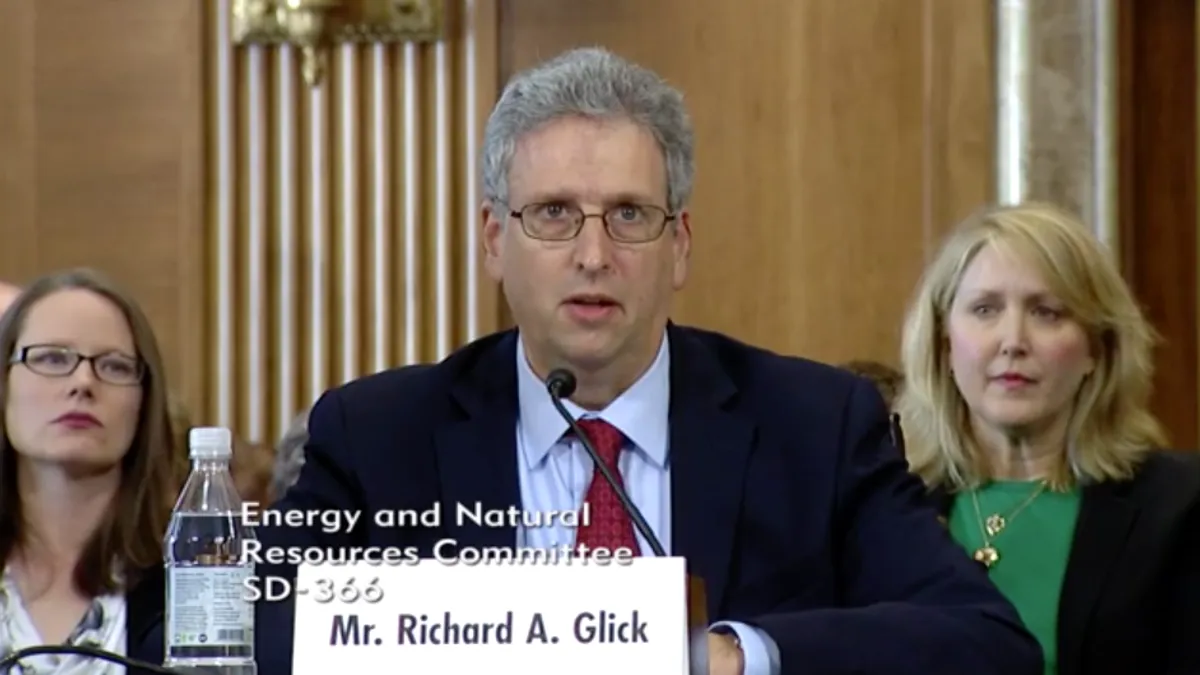Dive Brief:
-
Federal Energy Regulatory Commissioner Richard Glick on Thursday criticized the chairman of his agency for filing comments critical of the Obama administration’s Clean Power Plan in the Environmental Protection Agency's regulatory proceeding to roll back the climate regulations.
-
Glick called Chatterjee's comments "faulty" and "not relevant to any discussion on whether the Clean Power Plan (CPP) should be removed" because it focused criticism on the initial proposed version of the rule, not its finalized form, which included major changes to protect grid reliability.
-
Chatterjee filed his comments with the EPA in late October, warning the proposed version of the rule could have posed reliability issues. Glick said the chairman informed other regulators of the filing ahead of time, but called it "not appropriate" for a FERC member.
Dive Insight:
Glick's comments illustrate continuing anxiety in Washington over the potential politicization of FERC, an independent agency whose members typically stay away from overtly political statements.
In his comments to EPA, Chatterjee said the original version of the CPP could have threatened electric reliability and praised EPA's replacement, the Affordable Clean Energy rule, saying it "cure[s] some of the potential deficiencies."
FERC officials, however, contributed to major changes between the proposed and finalized versions of the CPP that assuaged many reliability concerns among utility leaders.
Glick focused on that point in his comments at an event hosted by the Great Plains Institute and Duke University’s Nicholas Institute on Environmental Policy Solutions on Thursday.
"The letter in a lot of ways was very faulty because the info that was provided was based on FERC's review of the proposed Clean Power Plan, not the final Clean Power Plan, which was much different," Glick said. "So whatever was said in that letter to me wasn't really relevant to any discussion of whether the clean power plan should be removed or not.”
Even if EPA abandoned its push to replace the CPP with the Affordable Clean Energy rule, it would fall back to the finalized CPP, not the original proposal.
"The final rule was set up in a much different way," Glick said, "and I think whatever reliability concerns might have existed with regard to the proposed rule were not necessarily relevant for the final rule, so I don't think the letter should carry much weight."
Chatterjee's comments were dated Oct. 31, the same day he told reporters at FERC headquarters that he would insulate the commission from political influence. In addition to reliability concerns, Chatterjee also argued the CPP was an illegal overreach of federal authority.
"[FERC] has recently explained that 'Congress has not granted the Commission the responsibility to affirmatively establish federal climate policy,'" Chatterjee wrote, quoting FERC's split decision this May to limit climate considerations in pipeline approvals. "The [EPA] should act with similar self-restraint here."













